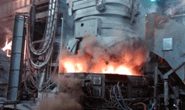Market Segment

April 21, 2022
Nucor Slammed Door on Russian Pig Iron After Invasion of Ukraine
Written by Michael Cowden
Nucor Corp. “immediately” halted sourcing pig iron and other raw materials from Russia following the invasion of Ukraine in late February, the company’s top executive said.
“The day after the invasion happened, we stopped buying materials immediately from Russia and have taken nothing from them,” Nucor president and CEO Leon Topalian said.
![]() “We pivoted very quickly to other sources around the world, and our customers are not going to miss a beat in deliveries or in quality,” he added.
“We pivoted very quickly to other sources around the world, and our customers are not going to miss a beat in deliveries or in quality,” he added.
Russian forces invaded Ukraine on February 24, 2022. Topalian made the comments during the Charlotte, N.C.-based steelmaker’s first quarter earnings call on Thursday, April 21.
Pig iron accounts for approximately 10% of Nucor’s metallic supplies in a normal year – and over half that amount typically comes from Russia and Ukraine. Today, pig iron is only 6% of Nucor’s raw materials mix, company executives said.
Nucor will continue to source from Ukraine in the future. “While we have not been able to source material from Ukraine since the war began, we look forward to parterning with our Ukrainian suppliers when conditions in the region permit,” Topalian said.
“The images coming out of Ukraine are heartbreaking, and our thoughts and prayers are with the Ukrainian people who continue to endure significant suffering due to the invasion,” he added.
The Black Sea region has typically been a key source of imported pig iron for electric-arc furnace (EAF) sheet mills in the US and abroad. They depend on virgin metallics to make more demanding grades of flat-rolled steel.
Today, parts of that region are a battlefield, notably in Mariupol, Ukraine, where Russian forces have surrounded Ukrainian troops and civilians inside the Azovstal Iron & Steel Works.
Nucor was able to immediately pivot away form Russian suppliers because it has numerous long-term relationships with pig iron suppliers elsewhere. The overnight shift was also made possible by the years of investments Nucor has made on the raw materials front, Topalian said.
Case in point: Nucor can source direct-reduced iron (DRI) from its plants in Louisiana and in Trinidad. And its scrap brokerage, the David J. Joseph Co. (DJJ), was able to secure enough scrap, including the prime scrap needed for its sheet mills.
Roughly 25% of Nucor’s metallics mix for sheet is prime scrap, company executives noted.
Nucor has in addition been investing for several years in technology that allows it to use more “low copper” shredded scrap. That has paid dividends in the current market – which has been characterized by a wide gap between prime scrap prices and prices for obsolete grades such as shred.
Copper can make steel more brittle and prone to crack in the automotive stamping process. That’s why sheet mills typically rely on prime scrap, which has fewer impurities, or virgin metallics such as DRI and pig iron.
Topalian demurred when asked whether Nucor would continue to spend money on mergers and acquisitions, whether in steel or in scrap, or whether it might make additional investments in DRI production.
“There are a whole lot of irons in the fire that I can’t talk about,” he said.
By Michael Cowden, Michael@SteelMarketUpdate.com







